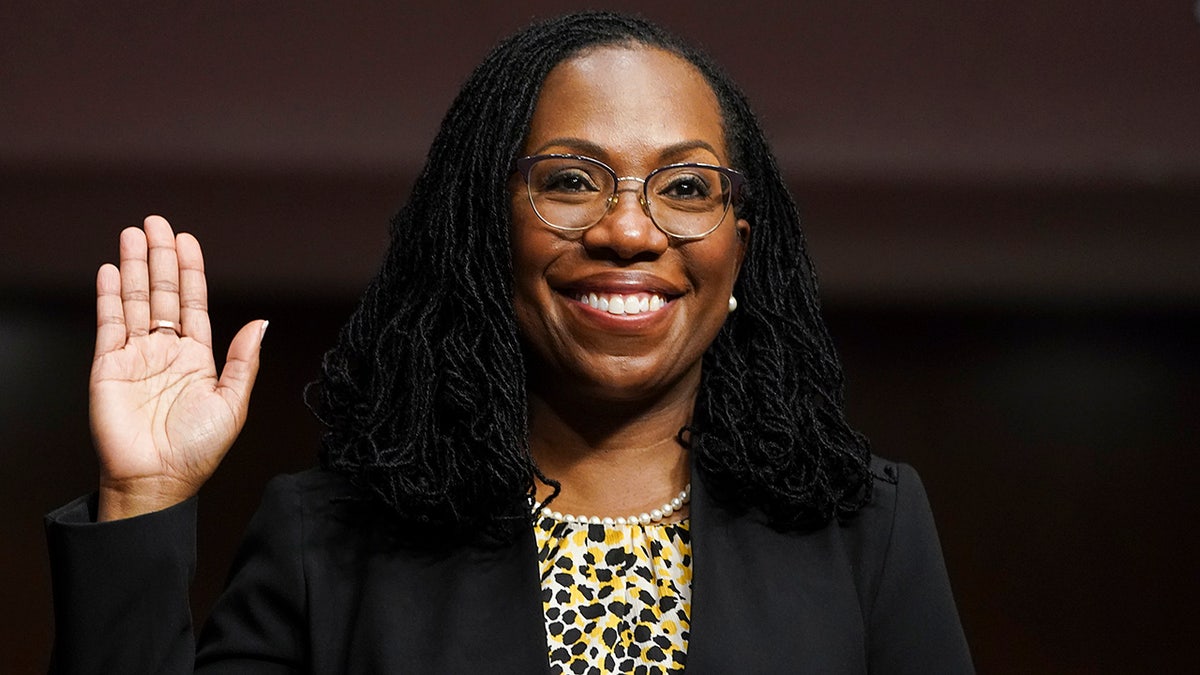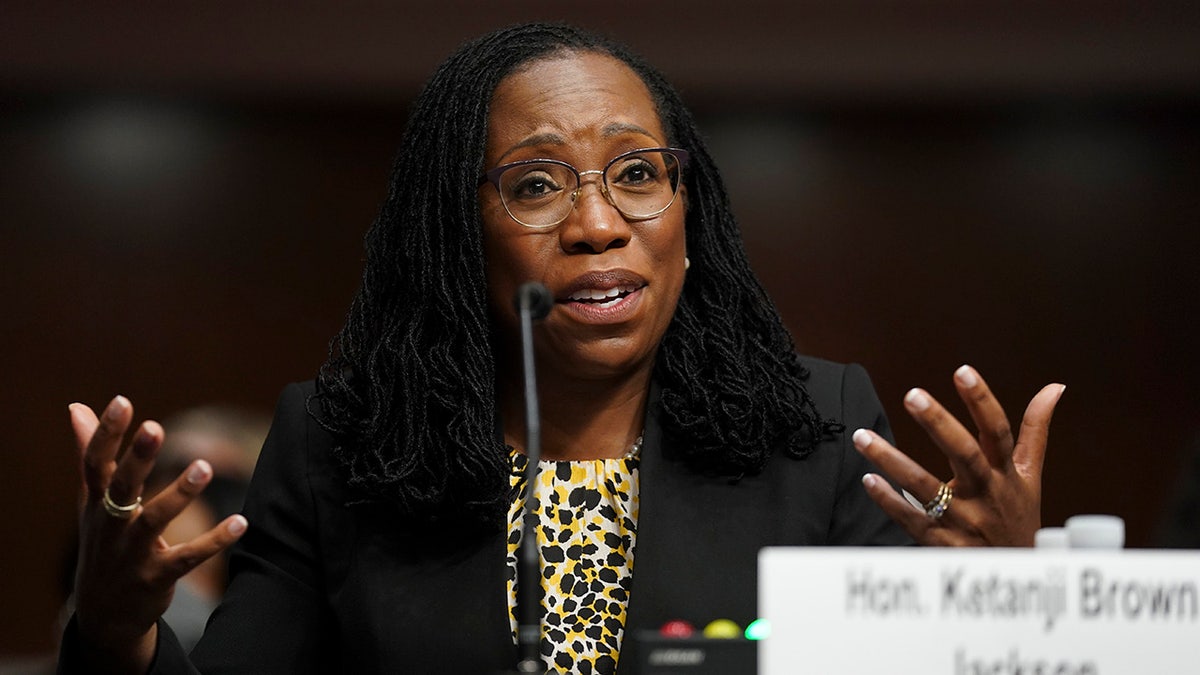After weeks of waiting, President Joe Biden announced on Friday that he will nominate Judge Ketanji Brown Jackson to the U.S. Supreme Court to succeed retiring Justice Stephen Breyer. If confirmed, Americans can expect a Justice committed to continuing her career of liberal activism on the bench.
A graduate of both Harvard University and Harvard Law School, Judge Jackson began her federal judicial service under President Barack Obama as a judge on the U.S. District Court for the District of Columbia. Just last year, President Biden elevated her to the U.S. Court of Appeals for the D.C. Circuit. She previously served as an Assistant Public Defender and on the U.S. Sentencing Commission.

WASHINGTON, DC - APRIL 28: Ketanji Brown Jackson, nominated to be a U.S. Circuit Judge for the District of Columbia Circuit, is sworn in to testify before a Senate Judiciary Committee hearing on pending judicial nominations on Capitol Hill, April 28, 2021 in Washington, DC. The committee is holding the hearing on pending judicial nominations. (Photo by Kevin Lamarque-Pool/Getty Images)
According to her record as both an attorney and a judge, Jackson lacks the dispassionate and unbiased disposition that Americans expect of Supreme Court Justices. Instead, her career is marked by far-left political activism.
In 2008, Judge Jackson was an election poll monitor for the Obama for America Presidential Campaign. Since 2007, she has been a frequent speaker at events hosted by the liberal and progressive lawyer’s association, the American Constitution Society.
Her commitment to progressive causes is so well-known (and appreciated) that she has earned the endorsement of just about every far-left association there is, including Demand Justice, People for the American Way, Human Rights Campaign, the Center for Reproductive Rights, Planned Parenthood, and anti-religious liberty groups like American Atheists, American Humanist Association, Americans United for Separation of Church and State, and the Southern Poverty Law Center.
Jackson’s record shows hostility toward constitutional values like free speech, religious liberty, and the sanctity of life. In 2001, she co-authored a friend-of-the-court brief before the U.S. Court of Appeals for the First Circuit on behalf of a litany of pro-abortion organizations, including the National Abortion Rights Action League (NARAL). Her brief in the McGuire v. Reilly case repeatedly disparaged pro-life sidewalk counselors—most often comprised of moms, grandmothers, nuns, and women who regret their own abortions. She unjustly attacked these loving ministers as a "hostile" and "in-your-face" "gauntlet," all while ignoring the very real hostility—whether from abusive partners, parents, or peers—that can coerce reluctant women into the abortion decision.
Pro-life advocates often engage in silent prayers outside abortion clinics. Jackson labeled these activities as "chaotic scenes" that should be stripped of First Amendment protections because they "are not pure speech, but rather are a form of expression analogous to labor picketing."
Americans can disagree on the issue of abortion and even dispute the efficacy of peaceful protests, but Jackson’s brief lacks the even-handedness one would expect of a future Supreme Court Justice tasked with protecting the First Amendment freedoms of all Americans. Reading Jackson’s brief, one quickly concludes that she has quite firmly chosen sides. Litigants in cases pitting abortion against core First Amendment rights would likely face a "home team" umpire in Justice Jackson, as she roots for abortion activities and jeers the free speech of pro-life advocates. In short, Jackson is not the neutral arbiter of the law one should expect to see on the Supreme Court.
Judge Jackson’s thumb on the scales for abortion over free speech may be a product of her mentorship. She clerked for Justice Breyer in 1999-2000. Interestingly, the year of her clerkship saw multiple decisions in cases involving abortion and religious expression.
For instance, during Jackson’s clerkship, Justice Breyer wrote the opinion in Stenberg v. Carhart. His opinion for the Court struck down a Nebraska law that banned the barbaric practice of partial-birth abortion. That term, in Santa Fe Independent School District v. Doe, the Court also severely limited student-initiated, student-led religious speech at public school football games.
With such a record there is little surprise that so many far-left activist organizations would endorse Judge Jackson’s judicial appointments. And, once on the bench, her activism did not stop.

WASHINGTON, DC - APRIL 28: Ketanji Brown Jackson, nominated to be a U.S. Circuit Judge for the District of Columbia Circuit, testifies before a Senate Judiciary Committee hearing on pending judicial nominations on Capitol Hill, April 28, 2021 in Washington, DC. The committee is holding the hearing on pending judicial nominations. (Photo by Kevin Lamarque-Pool/Getty Images)
In 2018, Judge Jackson ruled in favor of a federal employee union that sought to force collective bargaining, despite acknowledging that the President has both statutory and constitutional authority to issue executive orders pertaining to labor-management relations. Three years later, the AFL-CIO labor union "strongly" recommended Judge Jackson’s confirmation.
CLICK HERE TO GET THE OPINION NEWSLETTER
Such judicial activism squares with some comments Judge Jackson made at her confirmation hearings. During her confirmation to the D.C. Circuit, she refused to say whether a president may refuse to enforce a duly enacted, constitutional law, and she suggested that public schools that receive federal funding may discriminate against students on the basis of speech.
CLICK HERE TO GET THE FOX NEWS APP
Judge Jackson’s record speaks for itself. President Biden’s nomination is not merely substituting one liberal jurist for another. It is an aggressive move to push the Supreme Court hard in the direction of the political left.
If confirmed, Americans can expect a Justice Kentanji Brown Jackson to bring a lifetime of political activism to the court of last resort for so many of our freedoms, including free speech and religious liberty.
CLICK HERE TO READ MORE FROM KELLY SHACKELFORD
Editor’s note: The American Atheists organization did not join a March 17, 2022 letter from The Leadership Conference on Civil and Human Rights supporting Judge Jackson’s confirmation to the Supreme Court, despite remaining listed as a member of the Conference on the coalition’s website.













































